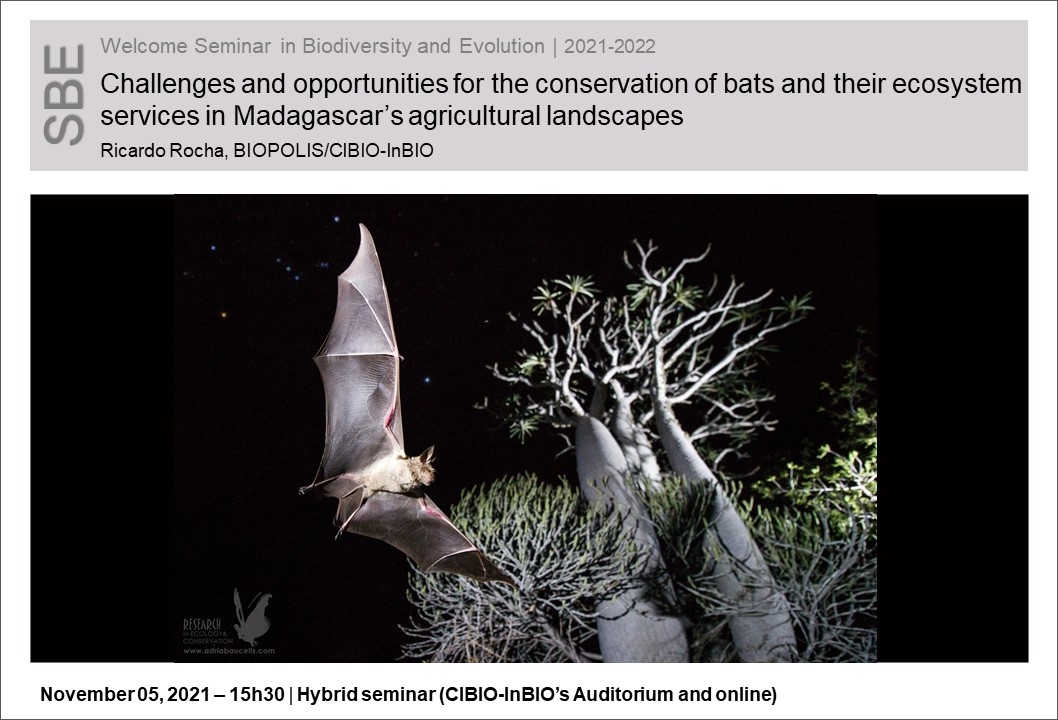Challenges and opportunities for the conservation of bats and their ecosystem services in Madagascar’s agricultural landscapes
05 Nov 2021 - Ricardo Rocha, BIOPOLIS/CIBIO–InBIO | 15h30

WELCOME SEMINAR IN BIODIVERSITY AND EVOLUTION
The conversion of natural habitats to agriculture is one of the main drivers of biotic change. Madagascar is no exception and land-use change, mostly driven by slash-and-burn agriculture, is impacting the island's exceptional biodiversity. Although most species are negatively affected by agricultural expansion, some, such as synanthropic bats, are capable of exploring newly available resources and benefit from man-made agricultural ecosystems. As bats are known predators of agricultural pests, it is possible that some Malagasy bats may roost and forage within agricultural areas, potentially providing important pest suppression services. In this talk, I will share the results of several studies in which we have used ecological and social methods to investigate how Malagasy bats respond to agricultural expansion, their potential role as agricultural pest suppressors, and, the knowledge and perceptions of, and attitudes towards bats by people living in the island’s agricultural-forest frontier. In particular, I will discuss I) the effects of the main land-cover types in Madagascar's agroecosystems on the diversity and foraging activity of insectivorous bats; ii) roost selection by synanthropic bat species in rural towns and villages; iii) consumption of agricultural insect pests and of human disease vectors by Malagasy bats; and, iv) human-bat interactions in Madagascar’s agricultural matrix. I end the talk by highlighting key knowledge gaps associated with our understanding of bat persistence in tropical agricultural landscapes and the ecosystem services they provide, and by presenting some of our ongoing work aimed at addressing these gaps in Madagascar.
I conduct interdisciplinary research at the interface of conservation science and ecology. Most of my research takes place in the tropics and sub-tropics and over the last ten years I have worked extensively in the Central Brazilian Amazon, Madagascar, Kenya and Macaronesia. I have a PhD in Conservation Biology from the University of Lisbon (2017) and a MSc in Conservation Science from Imperial College London (2008). My main projects are associated with the evaluation of the impacts of agriculture and forest fragmentation on tropical vertebrates and on the assessment of the effectiveness of conservation interventions. I was previously a Post-doctoral Research Associate at the Department of Zoology, University of Cambridge, working on the Conservation Evidence project (https://www.conservationevidence.com/).
[Host: Ana Filipa Palmeirim, BIOPOLIS/CIBIO–InBIO]
I conduct interdisciplinary research at the interface of conservation science and ecology. Most of my research takes place in the tropics and sub-tropics and over the last ten years I have worked extensively in the Central Brazilian Amazon, Madagascar, Kenya and Macaronesia. I have a PhD in Conservation Biology from the University of Lisbon (2017) and a MSc in Conservation Science from Imperial College London (2008). My main projects are associated with the evaluation of the impacts of agriculture and forest fragmentation on tropical vertebrates and on the assessment of the effectiveness of conservation interventions. I was previously a Post-doctoral Research Associate at the Department of Zoology, University of Cambridge, working on the Conservation Evidence project (https://www.conservationevidence.com/).
[Host: Ana Filipa Palmeirim, BIOPOLIS/CIBIO–InBIO]
Click here to watch the seminar recording